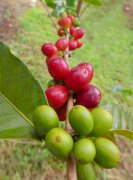This substance in coffee can help abolish the risk of developing diabetes.

For professional baristas, please follow the coffee workshop (Wechat official account cafe_style)
In recent years, researchers have identified substances in coffee that may help abolish the risk of developing type 2 diabetes. But a small number of these have been tested in animals. Now it seems that in a study in the journal of the natural product ACS, scientists report that one of these previously untested compounds appears to improve cell function and insulin distinction in laboratory mice. Look for new drugs that can inspire the development of new drugs to treat or even prevent the disease.
Some studies suggest that drinking three to four cups of coffee a day may reduce the risk of developing type 2 diabetes, afflicting nearly 30 million Americans. Initially, scientists suspected that caffeine was responsible for this effect. But the latest findings discount this possibility, suggesting that other substances in coffee may play a more important role. In an earlier laboratory study, Frederick Brustad Mellbye, S ø ren Gregersen and colleagues found an increase in insulin secretion in pancreatic cells of a compound called cafestol in coffee when they showed up in glucose. Cafestol is also effective in increasing glucose in muscle cells when it is a commonly recommended antiglycemic drug. In this new study, researchers will find out whether cafestol will help prevent or delay the onset of type 2 diabetes in mice.
The researchers separately are inclined to develop a second type of diabetes into three groups of mice. Two different doses of cafestol were provided. Ten weeks later, two sets of cafestol mice were provided with lower blood glucose levels and improved insulin secretion compared with the control group, and the compound was not measured. Cafestol also did not cause hypoglycemia or hypoglycemia, a possible side effect of some antiglycemic treatments. The researchers believe that daily consumption of cafestol may delay the onset of type 2 diabetes in these mice, and that it is a good candidate to prevent the development of drugs or in human disease.
Important Notice :
前街咖啡 FrontStreet Coffee has moved to new addredd:
FrontStreet Coffee Address: 315,Donghua East Road,GuangZhou
Tel:020 38364473
- Prev

This substance in coffee can help abolish the risk of developing diabetes.
Professional barista exchanges follow the coffee workshop (Wechat official account cafe_style) in recent years, researchers have identified coffee substances that may help abolish the risk of developing type 2 diabetes. But a small number of these have been tested in animals. Now it seems that in the journal of natural product ACS, scientists report a look at these previously untested compounds.
- Next

Fnc launches global opinion solicitation campaign to improve the efficiency of coffee harvesting in Colombia
For professional baristas, please follow the coffee workshop (Wechat official account cafe_style) Bogota, Columbia, Sept. 06, 2017 (GLOBE NEWSWIRE)-the Colombian Federation of Coffee growers (Colombian Coffee Growers Federation, FNC) recently launched a global opinion solicitation campaign aimed at improving the selective harvest of coffee in Colombia.
Related
- What is the difference between Indonesian Sumatra Mantinin coffee and gold Mantinin? How to distinguish between real and fake golden Mantelin coffee?
- What does bypass mean in coffee? Why can hand-brewed coffee and water make it better?
- Unexpected! Ruixing Telunsu lattes use a smoothie machine to foam milk?!
- % Arabia's first store in Henan opens into the village?! Netizen: Thought it was P's
- Does an authentic standard mocha coffee recipe use chocolate sauce or powder? Mocha Latte/Dirty Coffee/Salty Mocha Coffee Recipe Share!
- What is the difference between Vietnam egg coffee and Norway egg coffee? Hand-brewed single product coffee filter paper filter cloth filter flat solution!
- What is the difference between sun-cured and honey-treated coffee? What are the differences in the flavor characteristics of sun-honey coffee?
- How to make Italian latte! How much milk does a standard latte use/what should the ratio of coffee to milk be?
- How to make butter American/butter latte/butter Dirty coffee? Is hand-brewed coffee good with butter?
- Is Dirty the cold version of Australian White? What is the difference between dirty coffee/decent coffee and Australian white espresso?

